
Read this page in English: Silke Noll – Training and Consulting
Kia ora! Willkommen auf meiner Seite!
Ich komme ursprünglich aus Deutschland und lebe seit über zehn Jahren in Neuseeland – meiner Wahlheimat, in der ich heute als Beraterin, Trainerin und Autorin tätig bin. Gleichzeitig bin ich regelmäßig in Europa im Einsatz, um Organisationen dort mit meiner internationalen Perspektive zu unterstützen. Ich arbeite global – in Europa und Ozeanien – und in Deutsch, Englisch, Französisch, Italienisch und Spanisch.
Als Accredited Kanban Trainer der Kanban University bin ich Expertin für Flow in End-to-End-Wertströmen und der Projekt-/Portfoliosteuerung sowie für organisationsübergreifende Zusammenarbeit. Ich bin auch Gründerin der Kanban New Zealand Meetup Gruppe und des dazugehörigen Youtube Channels.
Organisationen unterstütze ich dabei, das Richtige zu liefern – zur richtigen Zeit und in der gewünschten Qualität: von der Strategie über Produkt- und Serviceentwicklung bis zum Kundenergebnis. Kanban setze ich als evolutionäre Veränderungsmethode ein, nicht als starres Framework – Praktiken und Prinzipien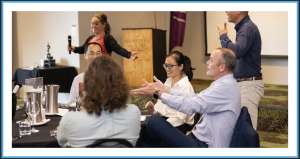 werden an Unternehmenskultur, Kontext und Rahmenbedingungen angepasst, sodass nachhaltige Verbesserungen in Zusammenarbeit, Lieferfähigkeit und Entscheidungsqualität entstehen.
werden an Unternehmenskultur, Kontext und Rahmenbedingungen angepasst, sodass nachhaltige Verbesserungen in Zusammenarbeit, Lieferfähigkeit und Entscheidungsqualität entstehen.
Als zertifizierte interkulturelle Trainerin und mehrfache Autorin liegt mein Fokus darauf, wie Kultur und Kontext die Arbeitsweise von Menschen beeinflussen, wie sie kommunizieren und Vertrauen aufbauen. Sowohl in meiner Kanban- als auch in meiner interkulturellen Arbeit geht es mir darum, systemisch zu denken – nicht darum, One-size-fits-all-Lösungen aufzusetzen. Hier geht es zu meinen Büchern Wahlheimat Neuseeland und Leben und Arbeiten in Neuseeland, sowie dem komplett neu geschriebenen Fettnäpfchenführer Neuseeland. Mit deiner Bestellung über Autorenwelten unterstützt du uns Autor:innen direkt – wir bekommen mehr vom Erlös. Vielen Dank!
Mit über 25 Jahren Erfahrung in Finanzmärkten, Banken, Versicherungen, Logistik, öffentlicher Verwaltung und Tech arbeite ich gerne in komplexen und dynamischen Umfeldern – und verbinde Strategie, Delivery und Kultur zu einer nachhaltigen Verbesserung der Zusammenarbeit. Viele europäische Organisationen schätzen gerade die Kombination aus kultureller Nähe und internationalem Blick – evolutionär statt radikal, praxistauglich statt dogmatisch.
Mein Hintergrund im Finanzmarktgeschäft und in strukturierten Finanzprodukten sorgt für ein hohes Maß an Risikobewusstsein, Strukturierungsfähigkeit und Entscheidungsstärke – und für die Fähigkeit, nahtlos zwischen Business und IT zu übersetzen.
Ich moderiere Workshops und Entscheidungsprozesse auf Team-, Bereichs- und Führungsebene mit klarem Fokus auf Ergebnissen, gemeinsamen Entscheidungen und nachhaltigem Fortschritt.
Dort, wo Strategie, Delivery und Kultur zusammenkommen sollen – ohne Framework-Theater –, können wir gemeinsam schnell spürbare Fortschritte erzielen. Ich freue mich auf ein erstes Gespräch!
Meine Schwerpunkte
- Unternehmensweites Abhängigkeitsmanagement – Koordination und Steuerung vernetzter Systeme.
- Portfolio-, Programm- und Multiprojektmanagement und Flow- / Delivery-Leadership – von der Strategie über das Backlog zur Lieferung. Nachhaltige Verbesserung von End-to-End-Flow über mehrere Teams und Services hinweg.
- Kontextgerechte Einführung und Weiterentwicklung von Kanban – evolutionär statt Framework-Dogma.
- Facilitation & ergebnisorientierte Moderation – gemeinsame Klarheit schaffen, Entscheidungen herbeiführen und Verantwortungsübernahme fördern.
- Interkulturelle Kompetenz als Hebel für Vertrauen, Führung und Zusammenarbeit.
- Messbare Verbesserungen – spürbar in Wochen statt erst in Monaten oder Jahren.
Wie ich arbeite
- Gute Zusammenarbeit ist kein Zufall – sie ist gestaltbar.
- Mein Motto: Jeder geht jeden Tag zur Arbeit, um gute Arbeit zu leisten. Wenn es anders wirkt, lohnt sich der Blick auf das System und den Kontext: Menschen brauchen Rahmenbedingungen, die gute Leistung ermöglichen – im Team wie in der Führung.
- Wo etwas gut läuft, braucht es keine Veränderung. Verbesserungen entstehen schrittweise, gemeinsam und organisch – ohne Überforderung, mit Transparenz und klaren Verantwortlichkeiten.
- Unterschiedliche Perspektiven können Gewinn oder Hindernis sein – ich helfe, das Beste daraus zu machen.
- Fragen öffnen neue Sichtweisen.
- Lernen ist kontinuierlich – was heute funktioniert, darf sich morgen weiterentwickeln.
Weiter unten findet ihr Infos zu Kanban sowie interkulturellen Trainings. Hier könnt ihr 45 Minuten Mentoring / Beratung buchen, um zu erfahren, wie Silke euch bei Kanban / Agile / ways of working oder bei interkulturellen Themen helfen kann. Wenn ihr nach Neuseeland einwandern wollt und Informationen zur Kultur und dem Arbeitsmarkt haben möchtet (keine Visaberatung!!), dann bucht bitte den untigen 30-minütigen Zoom-Call. Unter Silke's Unterkunfts- und Reiseseite findet ihr jede Menge Tipps zu eurer Neuseelandreise, insbesondere zu Wellington und der Nordinsel. Tipps, die ihr nicht unbedingt im Reiseführer findet, und die auch nicht die typische touristische Route darstellen, die fast jeder Tourist fährt, der nach Neuseeland kommt. Unter anderem auch nette Cafés und Restaurants, Neuseeland-Podcasts, Reiseliteratur und die neuesten Reiseführer, Kunstführer und Craft-Beer-Track, Boutique-Weingüter, Wandern und Biken, Tipps zu Zahlungsmöglichkeiten, die neuesten und besten Dokus über Neuseeland im deutschsprachigen Fernsehen, und vieles mehr. Wenn diese Tipps nicht reichen und ihr nicht wißt, wo ihr anfangen sollt, könnt ihr bei mir einen individuellen 30-minütigen Zoom-Call für €49,90 buchen. Danach könnt ihr euch fokussierter an die eigene, auf eure Bedürfnisse zugeschnittene Recherche machen.
Aktuelle Kanban Trainings (alle Trainings sind auch als Inhouse Trainings möglich)
- 04-05/02/26 Flow Manager online (ganze Tage unter der Woche)
- 05/02/26 Team Kanban Practitioner (nach der Arbeit unter der Woche)
- 12/02/26 Scrum Better with Kanban (ganztags unter der Woche)
- 18/02/26 Kanban System Design online (ganze Tage unter der Woche)
- 13-14/04/26 Kanban Systems Improvement online (ganze Tage unter der Woche)
- 13-16/04/26 Kanban for Design and Innovation (ganze Tage unter der Woche)
- 16/04/26 Kanban for Design and Innovation Extension (ganztags Donnerstag)
- 16/04/26 Scrum Better with Kanban (ganztags unter der Woche)
- 08-09/06/26 in der Berliner Zeitzone auf Englisch: Team Kanban Practitioner online (unter der Woche nachmittags).
- 15-16/06/26 in der Berliner Zeitzone auf Englisch: Flow Manager online (ganze Tage unter der Woche)
Die besten und neuesten Kanbanbücher auf deutsch (zu den englischen geht's auf der englischen Seite): Kanban - kurz und gut - Silke war eine der Reviewerinnen. Das Buch beschreibt viele Kanbantechniken wie wir sie in unseren Trainings leeren. Kanban - der evolutionäre Weg zu agilen Organisationen vom Gründer der Kanbanmethode und ins Deutsche übersetzt, beschreibt er auf sehr persönliche Weise die Entstehung und Entwicklung der Kanbanmethode und warum sie heute ist wie sie ist.
Spezialgebiete bei interkulturellen Trainings:
- Interkulturelle Trainings und Coachings, sowohl kulturübergreifend als auch kulturspezifisch
- Team Building, insbesondere im internationalen Umfeld
- Einzelcoachings, auch über einen längeren Zeitraum hinweg, meist von Neuankömmlingen in Ozeanien
- Ozeanien (Australien, Neuseeland, Pazifikinseln)
- Deutschland, Italien, Frankreich, Spanien, Großbritannien
- Moderation und ergebnisorientierte Begleitung von Kulturwandel
- in Teams (Agile Transformation, Unternehmenszusammenschlüsse, etc.).
- auf Management- und Vorstandsebene.
- im Licht von Unternehmenszielen (finanziell und strategisch), inklusive Buy-in über alle Unternehmensebenen hinweg.
Aktuelle interkulturelle Trainings (alle Trainings sind auch als Inhouse Trainings möglich)
- Interkulturelles Training Neuseeland, online auf Englisch, 6x2Stunden.
- Auf Anfrage: Interkulturelles Training Neuseeland, online in deutscher Sprache, 6×2.
- Intercultural awareness training – your start into intercultural agility.
- 03/06/24 in Berlin: Intercultural awareness training – your start into intercultural agility.
- 01/11/24 in Sydney: Intercultural awareness training – your start into intercultural agility.
- maßgeschneiderte interkulturelle Trainings (siehe oben für Spezialisierungen)
Zu diesem Buch hat Silke aus neuseeländischer Sicht beigetragen (Januar 2025): Global Cultural Interplay: Elevating the Art of Buiness Success Across Cultures
Okaloa Flowlab
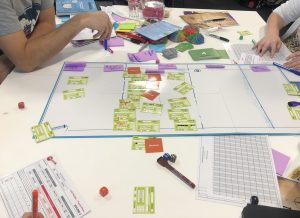
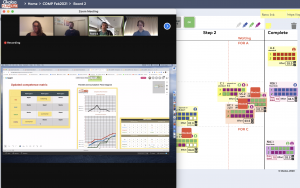
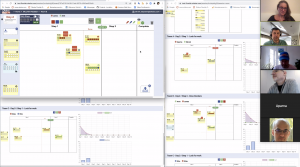
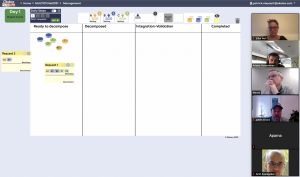
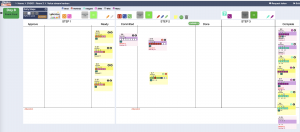
- Okaloa Flowlab Teamflow simulation (in-person and virtual version):
Through simulating a conventional work environment that reflects a mechanistic mindset characterized by a focus on resource efficiency, command and control and specialist workers, participants experience which roadblocks need to be overcome. As the team is taking its first baby steps into agile, they will experiment (in 2 or 3 rounds) with policies and practices (e.g. pull of work, cadences, limiting WIP) that enable collaboration, get the team into flow, and allow an agile mindset to emerge. Weaved into the simulations they will discover the fundamental difference between resource efficiency and flow efficiency.
- Okaloa Flowlab Workflow simulation (in-person and virtual version):
In most organizations work is handed over from one specialist role to another, following a certain sequence, also known as a workflow. Workflow cannot be ignored as it is an important part of how work is organized in most organizations, even including agile organizations. Participants will experience workflow (loopbacks) and dependencies. With this simulation we are simulating a typical workflow as defined in e.g. Jira or any other tracking system, whereby work goes from one person to another, and back in case of loopbacks. The Workflow simulation shows what Kanban really is about – differentiating between proto-kanban and Kanban as well as teaching how to deal with back-flow.
- Okaloa Flowlab Competence simulation (in-person version):
What happens when you have specialist workers involved when delivering value to the customer? When you rely on specialist workers, you automatically create dependencies, i.e. key man dependencies, and dependencies between work items. The purpose of this simulation is to experience bottlenecks as a result of assigning work to the specialist. This simulation is relevant when you want to introduce the concept of staff liquidity. It can be used in environments where methods like e.g. Kanban and Scrum are applied.
- Okaloa Flowlab Multi-team simulation (in-person version):
This simulation allows an experience of flow and collaboration across multiple teams that need to work together to deliver value. Individual teams can be competence, component or technology teams each with their own area of specialization. They could even be feature teams (full-stack teams) to the extent that each feature team focusses on its own feature set (e.g. check-out, …). The simulation demonstrates multi-tiered flow and collaboration across 2 different levels: 1) the request level and 2) work item level. One of the elements of this simulation is to experience bottlenecks in a multi-team context and the effects of this on delivering value. This simulation is relevant in combination with methods that address scaling.
